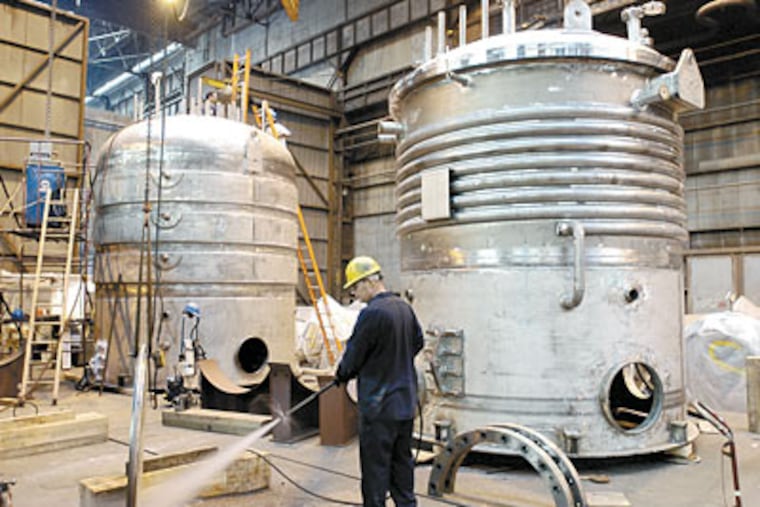A Phila. law firm gone nuclear
Countering the fallout over new generation of reactors.

Philadelphia-based Morgan, Lewis & Bockius, L.L.P., one of the nation's largest and most influential law firms, has become a major player in the resurgent movement to build the next generation of nuclear reactors.
After a decades-long hiatus, surging interest among utilities in construction of commercial nuclear power plants has produced a windfall of work for Morgan, which has quietly built the nation's largest practice dealing with nuclear reactors.
The Nuclear Regulatory Commission says it expects to receive applications for 34 new reactors through 2010, and Morgan lawyers are representing some two-thirds of the utility companies involved in those projects.
Because of a long fallow period for the industry, only a handful of firms nationwide have deep experience navigating the technically complex realm of nuclear regulation. Morgan, with a commercial nuclear practice of 32 lawyers established in 1995, was well positioned for the upturn.
Last fall, the firm won its biggest nuclear engagement, a five-year $47.7 million contract with the Department of Energy to shepherd the DOE's application to build a high-level radioactive waste disposal site at Yucca Mountain, about 100 miles from Las Vegas, Nev.
The contract could be renewed for another five years, for a like amount, when the initial phase is complete.
"It is exciting; it is the largest and most complex licensing action that the NRC has ever undertaken," said Jay Matthew Gutierrez, the leader of Morgan's energy practice.
For decades, the nuclear power industry had been in a state of suspended animation brought on in large measure by catastrophes at Three Mile Island and Chernobyl, which galvanized political opposition and turned public opinion decisively against the industry.
Its resurgence - and the consequent benefits for a handful of national law firms steeped in its complex regulation and technology - stems from a confluence of factors.
Surging power demand caused the Bush administration to call for increased reliance on nuclear power. Then in 2005, Congress passed the Energy Policy Act, which established tax and other financial incentives for power companies seeking to build new reactors.
The three commercial nuclear sites in the Philadelphia region, Three Mile Island, Salem and Oyster Creek, do not have plans to build new reactors.
Gutierrez, who worked from 1983 through 1989 as the NRC regional counsel in King of Prussia, where he focused on the restart of the Three Mile Island reactor, says the ongoing public concern over greenhouse gases also has helped make the political climate more favorable.
Starting in September of last year, a spate of new applications had been filed with the NRC and more are expected.
The last time the NRC had received an application for a plant that was subsequently built was in 1974. That meant a long dry spell for the industry and the lawyers who worked for it.
During that period, Gutierrez and his colleagues composed one of the few practice groups that focused on the industry, representing about half the existing plants in the U.S.
Until 1995, they represented utilities as a separate boutique-style firm based in Washington named Newman & Holtzinger P.C., when that company was recruited to join Morgan. At Morgan, the nuclear regulatory lawyers are part of a larger energy-practice group with 52 lawyers.
Morgan has 1,455 lawyers overall.
Despite the nation's changing energy needs, it is a practice that still is buffeted by political controversy.
Shortly after the Energy Department announced last year that it had awarded its legal contract to Morgan, Senate majority leader Harry Reid, a Democrat, and other members of the Nevada delegation urged the DOE to drop Morgan as counsel on the Yucca Mountain project.
Reid alleged that Morgan was embroiled in insurmountable conflicts of interest because it had represented energy companies in a dispute with the Department of Energy over the storage of nuclear waste pending construction of the long-term facility at Yucca Mountain.
The DOE rejected the complaint, as did the staff of the Nuclear Regulatory Commission and the DOE's Inspector General's Office. Morgan, for its part, said it would take care to strictly separate lawyers working on the Yucca project from lawyers involved in the litigation against the DOE.
But the Department of Justice soon weighed in, voicing concern that the DOE had not properly addressed the issue. The Justice Department has asked Morgan for more information about how it plans to overcome the conflict issues and Morgan has responded, according to Gutierrez.
The matter in effect pitted Morgan, and its client, the DOE, against one of the country's most important political figures, Reid, the leader of the Senate and an avowed foe of the Yucca Mountain project, with a little help from the Justice Department.
Given the DOE's finding that Morgan had properly handled the conflict issues, it is highly unlikely that Morgan will be forced from the Yucca project.
Whether that project will ever be completed, however, is another matter. Congress first identified Yucca as the nation's likely disposal site for highly radioactive nuclear waste in 1987. That decision was reaffirmed by President Bush and Congress in 2002.
The application to the NRC to build the disposal site was finally submitted in June. Yet most experts say that given the controversy surrounding the project, its completion is more than a decade away - if it is even built at all.